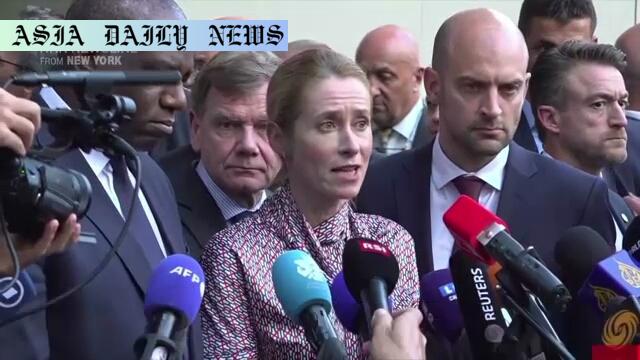Iran meets with European leaders in Geneva to de-escalate tensions and discuss nuclear policy, while upholding its defense stance.
- Iran and European diplomats met in Geneva to discuss escalating tensions in the Middle East.
- Iran emphasized its defense capabilities are non-negotiable during the high-level discussions.
- UN Secretary-General warned that ongoing developments could lead to global instability.
- The US President remains skeptical of European diplomatic efforts to mediate the crisis.

Iran Meets European Leaders in Geneva: A Strive for Peace
The recent meeting in Geneva between the Iranian foreign minister and European diplomats, including representatives from Britain, France, Germany, and the European Union, was a significant diplomatic effort to address escalating tensions between Iran and Israel. These discussions come at a precarious moment when the Middle East is on the brink of further destabilization. The involved parties expressed their commitment to dialogue and exploring options to reduce hostilities. Abbas Araghchi, the Iranian foreign minister, articulated Iran’s willingness to engage in diplomacy, provided that “aggression is stopped.” His firm stance on Iran’s defensive capabilities being non-negotiable, however, remains an assertion that reflects Iran’s priority on national sovereignty and security.
European Support versus US Skepticism
The European delegation, led by EU foreign policy chief Kaja Kallas, highlighted the necessity of ongoing dialogue. Kallas remarked on the dire consequences of continued conflict in the region, stressing that “regional escalation benefits no one.” She also welcomed US involvement in seeking a “negotiated solution.” However, US President Donald Trump’s dismissive response to the Geneva talks raised questions around his administration’s willingness to pursue effective diplomacy. While Trump provided a two-week timeline to decide on US involvement, his statement that “Europe is not going to help” underscores a growing divergence in approaches between the US and its European allies. Moreover, Trump’s refusal to ask Israel to stop its attacks reflects potential barriers to brokering peace in the region.
UN Secretary-General Warns on Global Instability
Meanwhile, at the United Nations Security Council, Secretary-General Antonio Guterres issued a stark warning about the trajectory of current developments. Emphasizing the gravity of the situation, Guterres stated that this moment could determine the fate of nations and possibly alter the global order. His urgent call for all parties involved to “give peace a chance” underscores the broader ramifications of the Iran-Israel conflict. However, achieving meaningful outcomes requires overcoming entrenched positions and fostering trust among stakeholders. Without active cooperation between Iran, Israel, and other regional players, the risk of further militarization and humanitarian fallout increases dramatically.
The Path Toward Resolution
The Geneva talks, though productive, reveal the complexities of diplomacy in such volatile circumstances. The insistence by Iran on protecting its defense capabilities while being open to dialogue marks a delicate balance that will require further skillful negotiation. For European nations, the challenge lies in maintaining dialogue and influencing both the US and Iran for comprehensive conflict resolution. With heightened sensitivity surrounding nuclear discussions and defense policies, parties must navigate these intricate dynamics to prevent irreversible damage to regional and global stability.
A Shared Responsibility for Peace
As the situation unfolds, it becomes clear that addressing the Iran-Israel tensions demands collective responsibility. This requires not only diplomatic perseverance but also a genuine commitment to multilateral cooperation. The stakes are high, and the eyes of the world are on leaders to demonstrate statesmanship, resolve, and the courage to prioritize humanity over political expedience. The ongoing efforts by the European leaders serve as a beacon of hope, but whether it translates into actionable peace remains uncertain. Iran has expressed its readiness for diplomacy, a sentiment that, if nurtured by global actors, could redirect the region from the brink of chaos toward a path of reconciliation and stability.



Commentary
The Significance of Geneva Talks
The Geneva talks mark a pivotal moment in international diplomacy, with profound implications for Middle Eastern stability and global peace. The fact that Iran is willing to engage in dialogue, despite its firm stance on defense, speaks volumes about its recognition of the importance of diplomacy in mitigating the ongoing crisis. This readiness, however, is contingent on halting aggression, underlining the urgency of adopting a unified approach to de-escalate violence in the region.
The Role of Europe in Mediation
Europe’s active involvement as a mediator highlights its vested interest in maintaining stability in the Middle East. The continent has frequently borne the brunt of refugee crises and economic fallout from conflicts in the region. By facilitating dialogue, Europe not only seeks to shield itself from potential repercussions but also reaffirms its commitment to peacekeeping on the global stage. However, its success depends on bridging the gaps between Iran, the US, and regional players—an uphill task that requires persistence and ingenuity.
US Reluctance and its Implications
President Trump’s skepticism toward European efforts reflects a deeper divergence in foreign policy priorities. While the US holds significant leverage in the region, its apparent reluctance to actively support diplomatic initiatives undermines the potential for a unified global approach. By dismissing Europe’s role and emphasizing aggressive measures, the US risks exacerbating tensions rather than alleviating them. Striking a balance between hard power and diplomacy is critical to fostering meaningful change.
Hope Amidst Challenges
Despite the challenges, the negotiations in Geneva offer a glimmer of hope. Iran’s openness to discussions presents an opportunity to build a framework for peace, provided all parties demonstrate genuine intent. The world cannot afford to ignore the urgency of the situation. The crisis goes beyond regional dimensions, carrying the potential to reshape alliances, economics, and global stability. The need for thoughtful and proactive leadership has never been more pronounced. Whether the players rise to the occasion or allow the situation to spiral remains to be seen, but the Geneva talks undoubtedly provide a critical starting point for peace.